Like most exterior home components, your roofing system is subject to weather damage year in and year out. Sometimes, the damage is severe enough to create problems, such as leaks that compromise your home’s look and feel. To keep your roofing system sturdy and performing well, make sure to deal with issues promptly. This means consulting a reliable roofing contractor from your area for the appropriate solutions.
Why You Should Not DIY
Most homeowners are sure they can handle any roofing problem on their own. Something as large and complex as your roofing system, however, will require a professional. Taking the DIY route leaves you open to a variety of risks. In fact, it’s very easy for the untrained homeowner to slip and fall when they’re not careful. Keep your feet firmly and safely on the ground and leave the work to a pro. Hiring a good roofing contractor is more cost-effective over the long run. Not only do they have all the tools, equipment and materials required for the job, they also have the necessary training and experience to complete the work on a budget and on schedule.
Choosing the Right Roofer For Your Project
Once you’ve decided to go for a professional roofer, start asking family and friends for local referrals. Referrals remain one of the most effective and accurate ways of knowing what to expect with a given contractor. After getting a list of prospective roofers, narrow down your choices. Choose carefully, because you’ll be depending on your contractor to ensure everything goes off without a hitch.
Here’s a checklist of essentials you should expect from a reliable roofing contractor:
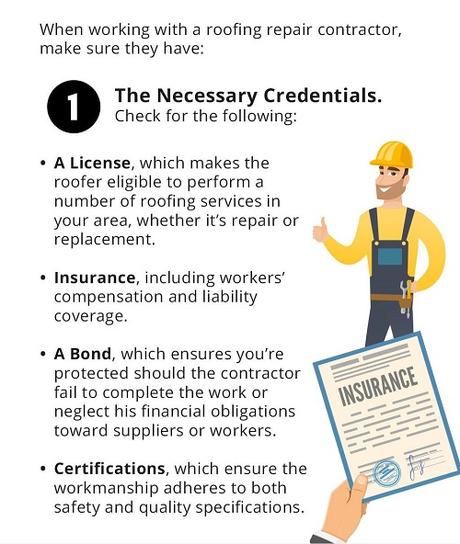
1. The Necessary Credentials.
Is your roofer really what they say they are? Make sure your prospective contractor is legit by looking for the basic credentials. These should include:
- A license, which makes your roofer eligible to perform a number of roofing services in your area, whether these are repairs or replacements. A licensed roofing contractor will secure the necessary building permits and will ensure the work adheres to local codes and safety requirements. Moreover, they’ll more than likely have a solid partnership with local suppliers and service crews.
- Insurance, including workers’ compensation and liability coverage. Worker injuries and property damage aren’t exactly unheard of in a roofing project. By working with an insured roofer, you can protect yourself and your investment better should anything go wrong.
- A bond, which ensures you remain protected should the contractor fail to complete the work, or neglect his financial obligations toward suppliers or workers.
- Certifications, which ensure the workmanship follows safety and quality specifications. Working with a certified roofer also allows you access to high-quality materials from prominent manufacturers, plus the generous warranties included with them.
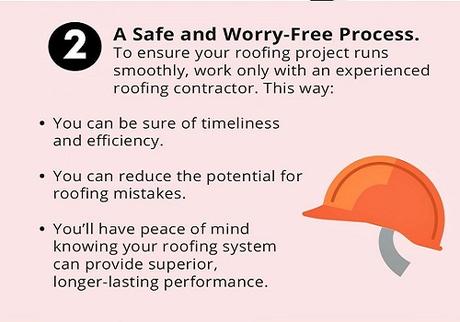
2. Safe and Worry-Free Process.
Working with an experienced roofing contractor can ensure the work runs smoothly from start to finish. That’s because they already have an established work process that maximizes efficiency without compromising quality. With a pro, you can expect timeliness and efficiency. They’ll reduce the potential for costly roofing mistakes. Plus you’ll have greater peace of mind knowing your roofing system can provide superior and longer-lasting performance.
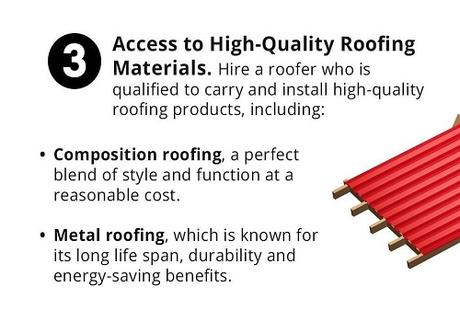
3. Access to High-Quality Roofing Materials.
Which roofing material is most suitable for your home and budget? Hiring a roofer takes the guesswork out of this quandry. They’ll work closely with you, helping you make informed decisions about your roof replacement. Most roofers are qualified to carry and install high-quality roofing products from the top manufacturers. These may include:
- Composition roofing, which offers the perfect blend of style and function at a reasonable cost.
- Metal roofing, which is a proven choice because of its long service life, durability and energy-saving benefits.

4. Solid Roofing Warranties and a Contractor Guarantee
If you want to add an extra layer of protection to your investment, make sure to choose a roofer who can offer excellent material coverage and a workmanship guarantee. Having these in hand ensures you’re covered should your roofing system start failing long before it should. Just make sure to avoid actions that can nullify these warranties. These include:
- Attaching an antenna or satellite dish to your roof.
- Installing skylights or solar panels onto your system.
- Hiring another roofer to work on your roofing problems.
- Pressure washing your roof.
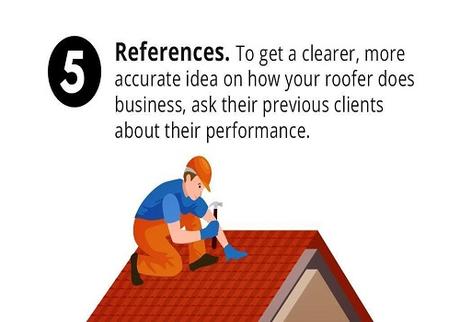
5. References.
Don’t forget to ask your prospective roofer for a list of references. By interviewing previous clients, you can get a clearer and more accurate picture of how your contractor does business. You can even add to this by looking your roofer up on prominent trade sites, like the Better Business Bureau’s, to see if they’ve earned satisfactory reviews and ratings.
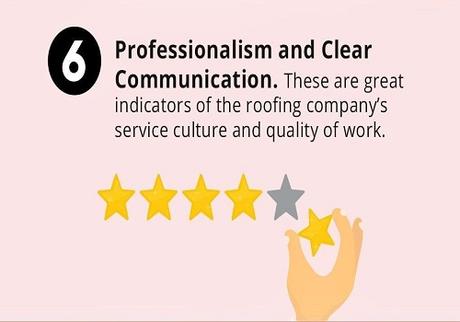
6. Professionalism and Clear Communication
These are great indicators of the roofing company’s service culture and quality of work. Establish confidence by observing just how professional your roofer can be when you talk to them about your concerns. Do they just shrug and give vague answers? Work only with a pro.
Careful research and planning are important when investing in a roofing upgrade. This is especially crucial when determining who your roofer will be. With the right one, you can ensure a safe and flawless experience. Just consider the essentials mentioned in the handy checklist above.
============================================================
Author Bio:
Mark Tiffee founded our company in 1995. In the beginning, we provided high quality residential and commercial siding and framing for builders. Mr. Tiffee saw the need for a high-quality, customer service orientated siding replacement company. He decided to concentrate the company’s efforts on siding replacement and A Cut Above Exteriors was born. Since then, A Cut Above Exteriors has become Oregon’s siding replacement leader. A Cut Above Exteriors has installed siding on thousands of homes, condominiums, row homes and commercial buildings.
============================================================
